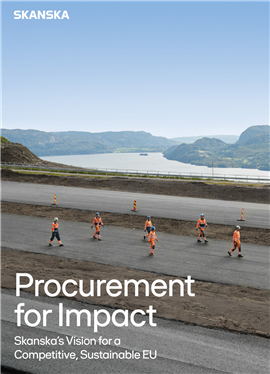Read this article in Français Deutsch Italiano Português Español
Skanska calls for EU procurement reform to drive climate action
23 September 2025
Public procurement, representing more than €2 trillion (US$2.4 trillion) a year across the EU, must be reshaped to accelerate the green transition and reward long-term value rather than lowest-cost bids, according to a new report from Skanska.
 Skanska’s “Procurement for Impact” report title page. Image: Skanska
Skanska’s “Procurement for Impact” report title page. Image: Skanska
The massive Sweden-based contracting group’s Procurement for Impact paper was published ahead of the EU’s planned 2026 revision of procurement legislation.
The report argues that outdated rules are limiting progress toward Europe’s climate goals and creating barriers for contractors offering sustainable solutions.
“Public procurement is still seen as a transactional exercise rather than a strategic tool,” the report states. “This suppresses innovation and disadvantages those who lead on quality and sustainability.”
The report raises the central questions Skanska is sending to Brussels: What should procurement achieve, and who ultimately benefits when contracts are awarded on price alone?
At stake is whether Europe’s €2 trillion (US$2.4 trillion) of public spending each year drives down emissions and fosters resilience, or locks in outdated practices that miss long-term value. The decisions made next year could have huge implications on both European construction and the global industry.
A €2 trillion lever for change
Procurement accounts for around 14% of EU GDP, but under current frameworks, criteria often default to lowest upfront cost.
 Lena Hök, Skanska Executive Vice President Sustainability & Innovation, and Anders Danielsson, Skanska President and CEO. Image: Skanska
Lena Hök, Skanska Executive Vice President Sustainability & Innovation, and Anders Danielsson, Skanska President and CEO. Image: Skanska
Skanska argues this overlooks the full picture of lifecycle costs, emissions, maintenance, and resilience.
Its report calls for reforms to embed climate and circularity criteria as mandatory, not optional. Proposals include setting quotas for low-carbon materials, mandating lifecycle costing, and scaling up use of competitive dialogue procedures in tenders.
“If aligned with broader policy goals, procurement can reduce dependency, unlock innovation and drive industrial decarbonization,” Skanska says.
The group contrasts this with the private sector, where supplier selection is already shifting away from immediate cost toward broader criteria such as carbon performance, technological innovation and social value.
For construction, it signals a shift from competing on lowest price to proving long-term performance; a change that could reshape how contractors bid, design, deliver and differentiate projects.
It also means future tenders may place equal weight on carbon performance, digital capability and resilience planning as on price, requiring contractors to demonstrate innovation to stay competitive.
In a joint statement in the report, Skanska Group President and CEO Anders Danielsson and Lena Hök, Skanska Executive VP, Sustainability & Innovation, said, “To achieve more, we need better rules. Today’s procurement framework wasn’t designed for tomorrow’s needs. In this report, we share project examples, policy insights and recommendations for the upcoming revision of the EU public procurement legislation.”
Lessons from project delivery
 Render of JFK Airport’s Roadways, Utilities and Ground Transportation Center project. Image: Skanska
Render of JFK Airport’s Roadways, Utilities and Ground Transportation Center project. Image: Skanska
Skanska highlights a series of projects that demonstrate how procurement rules can accelerate low-carbon construction:
- Stockholm’s Meatpacking District: Awarded through a competitive dialogue process, the scheme achieved a 70% cut in emissions compared with a conventional contract. Fossil-free machinery and a mass management plan enabled the reuse of 153,000 tonnes of material, meeting 72% of project needs.
- Lindesnes Care Center: Procured with climate performance as a core evaluation factor, the facility will become Norway’s most energy-efficient health building. Skanska and Lindesnes Municipality used a design-build process and competitive dialogue to prioritise recycled materials, energy-positive performance, and net-zero emissions goals.
- JFK Airport Ground Transportation Center: Delivered under a design-build contract, the Skanska Halmar JV worked with the Port Authority to integrate climate resilience planning, cutting projected operational energy use by more than 30% and embedding solar, water-saving and natural ventilation systems into the design.
Momentum for reform
 Render of Stockholm’s Meatpacking District project. Image: Skanska
Render of Stockholm’s Meatpacking District project. Image: Skanska
The EU has already launched consultations on the future of procurement.
Skanska notes that reform would reinforce broader EU ambitions under the Green Deal Industrial Plan and the Net-Zero Industry Act, anchoring procurement as a lever for industrial decarbonisation.
Its seven recommendations for EU action include:
- Mandating sustainability and resilience criteria in all public tenders.
- Setting mandatory targets for low-carbon materials and methods.
- Rewarding lifecycle value over lowest price.
- Expanding use of strategic procedures like competitive dialogue.
- Supporting capacity-building and guidance for public authorities.
- Fostering joint procurement for strategic sectors such as renewable materials.
- Fostering a culture of learning and performance.
“There is an enormous commitment in the construction industry and there are many technical solutions,” said Karl Jonasson Collberg, procurement officer for Stockholm’s Meatpacking District project. “It is possible to accelerate the climate transition and at the same time build more or less climate-neutral buildings at a significantly lower cost by 2030.
“However, many construction projects fail to contribute to this because their economic incentives are built around short-sighted lowest price procurement.”
STAY CONNECTED


Receive the information you need when you need it through our world-leading magazines, newsletters and daily briefings.
CONNECT WITH THE TEAM










